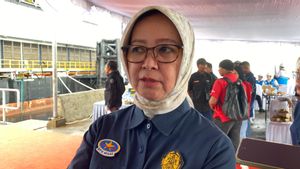JAKARTA - Chairman of the Indonesian Employers' Association (Apindo), Hariyadi Sukamdani, acknowledged that digital sales growth has increased rapidly amid the COVID-19 pandemic. However, it is certain that this increase has not been able to cover offline sales revenue.
As is known, the government again issued regulations related to handling the COVID-19 pandemic, namely the imposition of restrictions on community activities (PPKM) in the Java-Bali region. This policy will take effect from 11 to 25 January 2021.
In this new policy, the operating hours of the business world, especially shopping centers, may only be until 19.00 WIB. Meanwhile, restaurants can only serve on-site dining or dine-in as much as 25 percent from the previous 50 percent.
"So it is true that online sales are growing at this time. However, it cannot replace income from those selling offline. The food and beverage sector turns out that the offline contribution is much bigger than the online one," he said, in a virtual discussion, Friday, 8 January.
According to Hariyadi, not all of the various types of products that are marketed online are sold by consumers. Especially products that are used outside of daily needs.
"So, online products that are in demand are more for use in daily needs. For example, consumption needs are increasing. But still, they cannot replace (income) from offline," he said.
Previously, the Indonesian Hotel and Restaurant Association (PHRI) had projected that business turnover in the restaurant sector would drop by 70 percent during PPKM Jawa Bali on January 11-25, 2021.
This projection appears due to considering several things. First, the realization of the average decline in turnover of restaurant entrepreneurs has reached 50 percent to 60 percent throughout 2020. The decline in business turnover occurred due to the implementation of the first volume of PSBB, the transitional period, the second volume of PSBB, the transition period again, until the tightening of mobility during last year's holiday.
Second, the projection also takes into account the wider scale of PPKM implementation, covering the islands of Java and Bali.
Third, the occupancy rules for consumers who eat on the spot are getting less, namely only 25 percent from the previous 50 percent. In fact, orders from home or take away are not sufficient to cover potential income from dine-in.
The English, Chinese, Japanese, Arabic, and French versions are automatically generated by the AI. So there may still be inaccuracies in translating, please always see Indonesian as our main language. (system supported by DigitalSiber.id)













